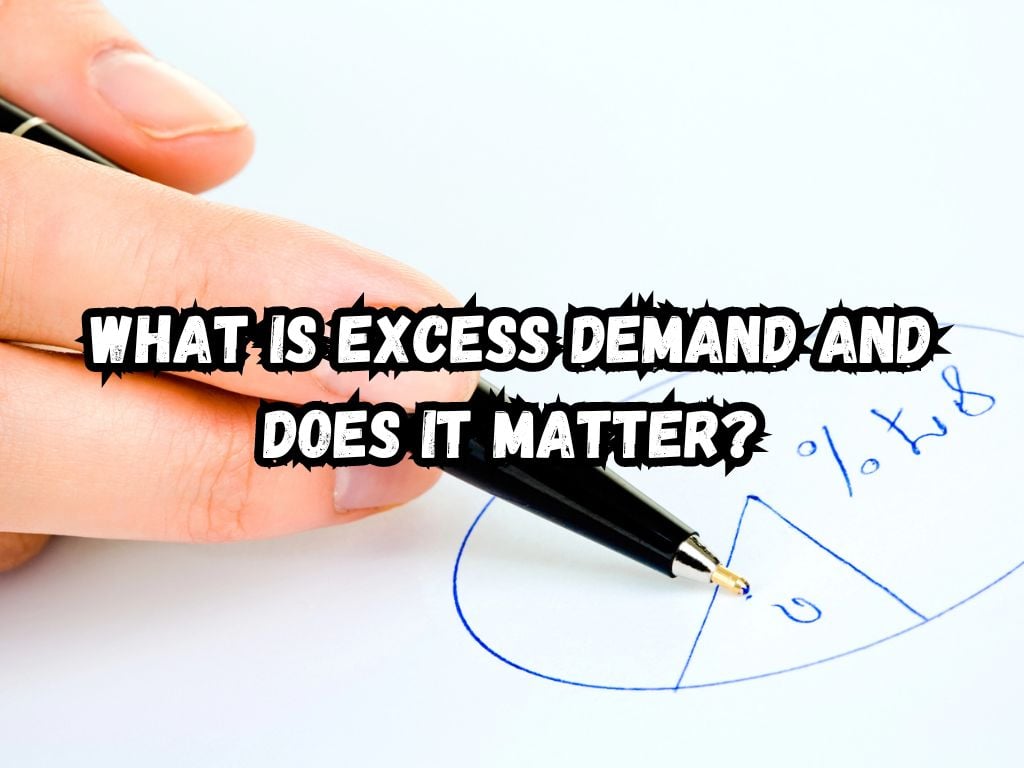In the world of economics, understanding the forces of demand and supply plays a crucial role. One phenomenon that often stirs interest among economists and business strategists alike is excess demand.
But what exactly does this term mean, and why does it matter in real-world markets?
This article aims to unpack the concept of excess demand, explore its implications, and offer insights into how it can be managed effectively.
What Is Excess Demand?
At its core, excess demand occurs when the desire for a product surpasses its availability at the current price. It’s a scenario often seen in various markets, from the latest tech gadgets to essential commodities.
Several factors can lead to this imbalance. Sometimes, it’s a sudden spike in consumer interest or purchasing power.
At other times, it could result from limited supply due to production issues or natural constraints.

The Mechanics Behind Excess Demand
Price acts as a balancing agent in normal market conditions, adjusting to keep demand and supply in harmony.
However, during periods of excess demand, this balance is disrupted. For example, during holiday seasons, the demand for certain toys might skyrocket, outstripping supply and causing a significant imbalance.
Represented graphically on a demand-supply curve, excess demand is illustrated by the point where the demand curve surpasses the supply curve, signaling a need for adjustment.
Implications of Excess Demand
The effects of excess demand ripple across the economy, businesses, and consumers.
Economic Impacts: Excess demand can lead to inflationary pressures as prices increase in response to the high demand and low supply scenario.
If unchecked, this can lead to market instability and even contribute to economic bubbles.
Business Impacts: Companies facing excess demand for their products might see opportunities for increased profits.
However, they also face the challenge of potential stock shortages and customer dissatisfaction due to the inability to meet demand.
Consumer Impacts: For consumers, excess demand means higher prices and limited product availability.
Some might be forced to seek alternatives, often at a lesser value or higher cost.
In the long run, excess demand can encourage competition and innovation as businesses strive to meet consumer needs and capitalize on market opportunities.
Yet, the immediate effects often pose challenges that require strategic responses from businesses and policymakers.
Real-World Examples
We’ve seen excess demand play out in various sectors, from the frantic scramble for the latest smartphones to panic buying in grocery stores during emergencies.
Each instance highlights the market’s dynamic nature and the critical role of demand-supply balance in maintaining economic stability and consumer satisfaction.
Managing Excess Demand
Businesses often employ strategic pricing, increase production, or find ways to manage consumer expectations to counteract excess demand.
Government interventions, such as implementing price controls, encouraging imports, or stimulating production, also play a vital role in addressing excess demand.
For consumers, staying informed and exploring alternatives can help navigate periods of high demand and limited supply.
The Significance of Understanding Excess Demand
For businesses, grasping the concept of excess demand is essential for inventory management, pricing strategies, and maintaining customer relationships.
Policymakers must understand these dynamics to implement measures that ensure economic stability and consumer protection.
Consumers, too, benefit from understanding excess demand, as it helps them make informed purchasing decisions and avoid overpaying for products.

Frequently Asked Questions
What are the chief causes of excess demand?
The main triggers include sudden surges in consumer interest, limited supply due to production issues, and increased consumer purchasing power.
How does excess demand affect the economy in the long term?
While it can stimulate innovation and competition, unchecked excess demand may lead to inflationary pressures and economic bubbles, posing risks to long-term stability.
Can excess demand be beneficial for any sector?
Yes, sectors witnessing excess demand often experience rapid growth and innovation as businesses compete to meet consumer needs.
How do consumers typically respond to excess demand situations?
Consumers may resort to panic buying, seek alternatives, or delay purchases until the market stabilizes.
What strategies can governments employ to mitigate the negative effects of excess demand?
Implementing price controls, encouraging imports, and boosting production are effective measures to address excess demand.
Conclusion
Understanding excess demand is crucial for navigating the complex dynamics of the market.
Whether you’re a business owner strategizing on inventory and pricing, a policymaker aiming to ensure economic stability, or a consumer making informed purchasing decisions, recognizing the signs of excess demand and knowing how to respond can make a significant difference. As we’ve explored, excess demand holds both challenges and opportunities.
By adopting strategic approaches, businesses, governments, and consumers can effectively manage its effects for positive outcomes.


 Tags:
Tags:










